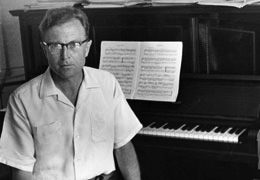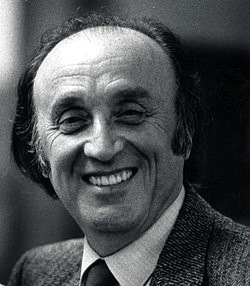The Well-Tempered Ear
Classical music Q&A: It is time to rediscover composer Luigi Boccherini, says acclaimed cellist Amit Peled, who on Friday night will perform with the Wisconsin Chamber Orchestra, which he calls “one of the best chamber orchestras in the U.S.” | January 11, 2012
UPDATE: The FREE astronomy program this Saturday at the UW Space Place about the Madison Opera‘s production of Philip Glass’ “Galileo” has now been filled. I posted about the program on Monday, if you want to read about it.
By Jacob Stockinger
That is when the Wisconsin Chamber Orchestra will perform a program of Classical and modern music under the baton of WCO music director Andrew Sewell.
Tickets are $15-$62. Call the Overture Center box office at 608 258-4141. For more information about the program and tickets, visit:
http://www.wcoconcerts.org/performances/masterworks/26/event-info/
The program is classic Sewell (below), who likes to mix it up and introduce the audience to new works they probably don’t know as well give them a chance to hear a familiar work or composer they love.
This program features a well-known masterpiece, the Symphony No. 100 (“Military”) by Hadyn, one of Sewell’s specialties for which he has been praised. There will also be a work, “Diversions for Sttring Orchestra,” by the 20th century composer Douglas Lilburn (below, 1915-2001) who, like Sewell, hailed from New Zealand.
The program also features an unknown work, “Kaddish,” based on the Hebrew service for the dead – a kind of Jewish requiem – for cello and strings by the little known contemporary Russian-Israeli composer Mark Kopytman (1929-2011).
And there will be a Cello Concerto by Luigi Boccherini (1743-1805), an unjustly neglected composer of the Classical era.
The guest soloist, returning to the WCO for a second time, is the acclaimed cellist Amit Peled (below), who concertizes widely but also teaches at the Peabody Institute at Johns Hopkins University in Baltimore, Maryland.
His website, which has his biography, reviews of his concerts, his statement about his teaching philosophy, a list of recordings and more, can be found at:
And here is a long interview with Peled on a website devoted to the cello:
http://www.cello.org/newsletter/articles/peled/peled.htm
Peled, a busy performer and pedagogue, kindly agreed to an interview about his upcoming concert in Madison:
You have played here before. How do you like Madison?
I love Madison. I have been there several times. I have played at the University of Wisconsin and performed with the Wisconsin Chamber Orchestra. It is a little too cold, but I love the town and the people and the restaurants. It is a really nice place.
The Wisconsin Chamber Orchestra (below) is one of the best chamber orchestras in the U.S. Playing with them is literally like playing chamber music. There’s no feeling of accompanying or the group being superior to the soloist.
It has a lot to do with Andrew being in charge. I am looking forward to this concert. I love performing with them. And we will do the same combination of Baroque and Jewish music that we did last time, except that last time the Jewish piece was an encore.
Speaking of Jewish music, what can you tell us about the “Kaddish” by Mark Kopytman?
The piece is not well-known in the U.S. although I have recorded it. I knew the composer (below), who just passed away last month. I worked with him on the piece. There is a direct story line in it that I might be allowed to tell the audience before I play it.
He grew up in Russia and was a big admirer of Shostakovich. it has a lot of Shostakovich. It is a very exciting piece of the orchestra as well. I would think it is probably a Midwest premiere as well as a Madison premiere. I thin the combination of this and Boccherini will be wonderful.
The language is very tonal and accessible. The whole piece is a dialogue between the cello, which is the surviving son, and the orchestra, which is the dead father.
What do you want to say about Boccherini and the concerto?
For cellists, Boccherini (below) is like the Bible. He was a great cellist and wrote 13 concertos for the cello as well as quintets with two cellos that are really gorgeous. But Gruetzmacher, who was a 19th-century cellist, reworked this one in a more Romantic way. For us cellists, it is fun to play because it is even more lyrical and singing, and more demanding technically, than what Boccherini originally wrote. So it has become the most famous of all the Boccherini cello concertos.
Boccherini was an Italian composer who lived in Spain, but his music has the quality of an Italian opera aria all through the piece. It is just gorgeous.
It in the 1950s, everybody played this concerto. (See the Jacqueline du Pre at bottom.) Now it mostly a student piece, though students often find it too difficult technically. So I am happy that Andrew was open to doing it.
It is an exciting piece. Boccherini has been overshadowed by more famous contemporaries such as Haydn and Mozart. But the concerto is a fine piece and it is a pity it is neglected today.
There are wonderful pieces that unfortunately we cellists don’t get to play. Orchestras always want to give audiences the safe cello pieces — the Elgar, Dvorak and Schumann concertos — and not take a chance. In that sense Andrew is very brave to program two pieces that are not played very often. More people should know Boccherini and I hope people will like it.
I hope Boccherini receives a major revival or rediscovery. The best thing I can do is to promote him and play his music. The rest is left to the public and music organizations around the country to give it a chance. I am excited about it.
This week you will also teach students at Middleton High School. How well do performing and teaching go together?
I love the combination of teaching and performing. (Below is Peled with students at the Peabody Institute.) It is great to try to verbalize everything I try to do with the cello to students. But when I teach too much, I miss the playing and when I play too much, I miss the teaching. So it is a good combination for me.
Leave a Comment »







Leave a comment